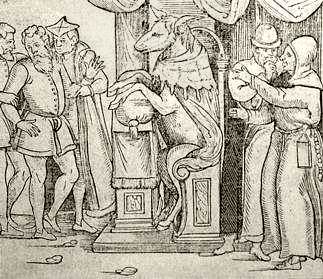The ecclesiastical law: nosy neighbours
Those Elizabethans who challenged the law faced a kind of double jeopardy: there were two legal systems, each with its laws, officers, trials--and punishments. The ecclesiastical courts tried such crimes as sexual offences: adultery, fornication, bigamy, and so on.
Minor officials (beadles, promoters) spied out offences, often at the prompting of neighbours; those who were accused were required to collect a certain number of character references from distinguished local people to be acquitted. The system was ripe for abuse and petty vengeance. (Petty--and petting--crime*.)
The punishments often involved public humiliation: the pillory; or standing at the church door or market in a penitential gown for a certain number of times.
Fish on Friday?
Fasting was required by law, more to support the fisheries than for religious reasons, but the enforcement of the law fell under the aegis of the ecclesiastical courts. Middleton's A Chaste Maid in Cheapside has a scene where two odious "promoters" stop passers by to inspect their baskets, confiscating those that have meat (intending to eat it themselves, of course). They are duped by a "Country Wench," who gives them an unwanted child--hidden under a leg of mutton.
Footnotes
-
Self-policed communities
In the absence of any police force most parish law enforcement was handled by the community as a whole. A certain level of petty crime seems to have been tolerated in order to keep the peace, and even felons were usually not indicted unless they were persistent offenders.
One persistent offender who was treated with lenience was the labourer John Aston of Shropshire, whose endearing qualities seems to have mitigated his offences: "a sort of silly fellow, very idle and much given to stealing poultry and small things."
A little too nosy?
The operation of the archdeacon's court, which met once every three weeks, was especially dependant upon nosy neighbours. The aim of government to enforce godliness and discipline meant that the courts focused upon such "crimes" as poor church attendance, sexual impropriety, drunkenness, or otherwise morally offensive behaviour.
Some unusual situations could arise from persons spying on each other, as in the Somerset case in which a farmer reported a couple he observed in the act of sexual intercourse in "a plot of grass under a hedge":
When John and Hanna had almost ended what they were about this informant stept unto them and took John by the tail of his shirt and demanded of them why they were so wicked as to commit such a wicked act, to which John said that Hannah was his wife by promise and that he did intend to marry her the next morning at eight of the clock.
(Quoted in J.A. Sharpe's Crime in Early Modern England 1550-1750. (1984), 86.)
